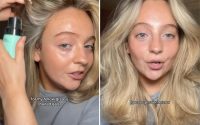Gen Z gals on growing out body hair: it’s ‘sexy’ and ’empowering’
Model Sydney Jordan admits she’s lost out on a number of fashion gigs — by a hair.
“I’m not willing to shave. This is part of my brand,” the 25-year-old told The Post of her fuzzy armpits and legs. Jordan, who lives in Ohio, has been warned by her agent that body hair is “not industry standard,” but she doesn’t care.
“I’m trying to normalize this,” she said.
Lately, women have been raising hell by ditching their razors. After two years of the COVID-19 pandemic, in which gals gave up everything from hair dye to heels, ladies are flocking to TikTok to show off their all-natural approach to grooming, where the hashtag #bodyhairisnatural has more than 91 million views. And the pro-body hair movement is gaining ground offline, too. According to the 2021 YouGov Body Image Study, 35 percent of Americans have no preference if women shave or not, while 7 percent said they should not shave. For respondents between the ages of 18 and 35, female fur proved to be even less of an issue, with a majority confessing that they either find armpit hair attractive or don’t care if a woman has it.

And while Jordan is getting pushback for her anti-shaving stance, other pinups are being rewarded for daring to be hairy.
“People never cared if I shaved,” 25-year-old model Elyanna Sanchez, who boasts more than 93,000 followers on Instagram, told The Post. “It just felt normal [to have body hair].”
The model, who splits her time between Los Angeles and Manhattan, appeared in a 2019 underwear ad for Calvin Klein that prominently features her fluffy underarms. Sanchez said she didn’t shave that day because she “didn’t really think about it.”
While the client had no problem with her au naturel look, Sanchez said commenters online weren’t so kind, which she sees as hypocritical. “People say, ‘Can you use real models?’” she said of the pressure fashion companies get to hire more typical-looking people. “And then everyone bashes them and calls them ugly.”

Nevertheless, brands are increasingly taking big risks on body hair.
UK-based razor brand Sunny writes in their tagline, “To shave or not to shave, it’s no biggie is it? Prickly or smooth, it won’t change the world.” And American shaving company Billie is the first brand of its kind to show images of women with untamed hair on their legs, underarms and even inner thighs.
Flaunting hairy underarms scored supermodel Ashley Graham a partnership with razor brand Harry’s. After she landed the gig, she responded by posting a video on TikTok with her laughing at headlines about it — sticking it to the haters online who assumed beauty companies would only show clean-shaven women.

Now, regular women are giving the hirsute life a try.
Brooklyn native and artist Chanté Glover, 29, said that when they first started growing out her body hair in 2016, they felt “pretty alone in my friend group.”
Now, however, Glover finds the change “empowering.”
“I actually got to a place of really loving it,” said Glover, who added that they’ve received an outpouring of support from friends and followers online. “There’s no shame in what we are and embracing what we are. I find [having body hair] to be a sign of confidence and adulthood.”

Virali Patel, a 28-year-old Londoner, also posts odes to her body hair online.
“I feel a lot of women are tired of changing themselves in order to fit in society’s definition of beautiful,” said Patel, who recently gave up on hair removal after 20 years of shaving and waxing. “We’ve been conditioned to believe smooth skin is sexy, and having hair makes us look ‘manly’ and unworthy of love — which just isn’t true.”
New Yorker, author and sex worker Liara Roux, who describes her job as “being hot online,” said posting pics of her body hair on social media validates other women who want to try tossing their razors.
“I’ve had some people tell me that they decided to start growing out their body hair after they saw me with it,” Roux, 32, said. “Because it’s just my job to be naked online and be hot, it sort of gives other people permission to do that … It’s easier for people to be like, ‘Oh, you can still be very attractive to people.’”


